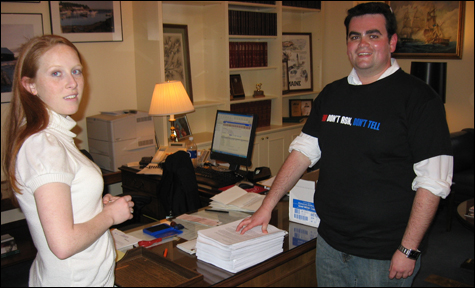
ON THE DESK: Did Senator Snowe’s staff lose these letters? |
Maine senators Olympia Snowe and Susan Collins are — relatively speaking — gay friendly: their offices have non-discrimination policies, and they represent a state that in 2005, after a decade-long effort, solidly endorsed protecting gays’ civil and human rights.
And while both refused to endorse the Maine Won’t Discriminate effort, saying it was their policy to avoid state issues, don’t try to pin either senator down on what clearly is a federal issue: “Don’t Ask, Don’t Tell” (DADT). That’s the military’s 14-year-old policy that allows gays to serve, as long as they keep their sexual orientation — and any behavior that could indicate it — to themselves. Activists have tried for years to get Snowe and Collins to speak out against “Don’t Ask, Don’t Tell,” but the response from both senators is a kind of runaround — it appears well-meaning, is unfailingly polite, but in the end is unsatisfactory for its lack of awareness that this is a real problem that affects real people.

That’s where student activist Andrew Bossie comes in. As he prepared to graduate and leave his post as student-body president at the University of Southern Maine (USM) last month, he decided there were a couple more issues he wanted to tackle: the military’s ban on gays serving openly and the silence of Maine’s two senators on the issue of “Don’t Ask, Don’t Tell.”
A Caribou native (like Collins), the openly gay Bossie serves as the president of the Opportunity Maine referendum campaign, and on campus has tackled everything from the Red Cross’s ban on gays giving blood to widespread campus organizing for Maine Won’t Discriminate in 2005.
In April, Bossie introduced a resolution to the USM Student Senate opposing “Don’t Ask, Don’t Tell” and supporting the Military Readiness Enhancement Act, a bill introduced in March by Congressman Marty Meehan (D-Massachusetts), a member of the House Armed Services Committee, to allow gays to serve openly in the military. The USM resolution passed, and nicely dovetailed with efforts by a group of University of Maine Law School students who simultaneously made national news for their work opposing DADT and reaching out to Collins and Snowe.
Chances are, you’ve heard of the controversy surrounding “Don’t Ask, Don’t Tell,” particularly if you’re among the majority of people in the US who oppose the policy.
What has Bossie, the UMaine Law students, and activists puzzled is why Collins and Snowe have side-stepped the issue almost completely, despite request after request for something as little as a comment. That includes repeated attempts from the Phoenix for this article.
Snowe’s communications director, David Snepp, promised comment on DADT, but did not provide it prior to publication. Collins went farther — but only barely. After several requests for comment from her office, Collins’s communications director, Jen Burita, said, “At some point, Congress will likely reexamine the ‘Don’t Ask, Don’t Tell’ policy that President Clinton put in place in 1993. Senator Collins believes that this reconsideration will have to balance the demands on our military forces, the challenges of instituting major policy changes during wartime, and the input provided by our military leaders.”
This is not new — and both Snowe and Collins have for years walked a line between how they are perceived at home (as moderates who buck the party line) and in Washington (as party-line followers on most issues; see “Ditched,” by Sara Donnelly, March 3, 2006).
When activists got behind the Military Readiness Enhancement Act last year, both senators indicated they don’t see a problem with DADT. Snowe told a Maine Republican activist that she didn’t realize that there was any opposition to DADT (see “Silence Kills,” by Tony Giampetruzzi, May 25, 2006). Collins, unlike Snowe, agreed to a conference call with activists last year, but was bewildered when asked to speak out against DADT.
“What else do they want us to do? Will it take having city councils passing resolutions across the state? Perhaps a resolution in the State House? I wish they would tell us, and we’ll do it,” says Bossie.
Out of touch
Unaware that DADT is controversial? Unlikely. Snowe was serving in the US House in 1993, and mover/shaker Collins was likely plotting her course to the Beltway when Bill Clinton made his 1991 campaign promise to overturn the ban on gays in the military. As two senators who have made military policy a priority, they must know that a policy blunder quickly erupted.
Colin Powell (then the chairman of the Joint Chiefs of Staff), the military elite, and lawmakers lifted the military’s ban and replace it with “Don’t Ask, Don’t Tell,” letting gays and lesbians serve in the military as long as they keep their sexual orientation a secret. At the same time, commanders can’t “ask” whether someone is gay. The witch-hunt days were over, but the new law has been capriciously used at the whim of those in charge, and, until recently, gays and lesbians were actually tossed out more than ever before.